- Research
- Research Centers
- Journals
- Admission
- Introduction
- Programs
- Application
- Alumni & Giving
- Alumni Club
- Giving
The 2022 International Communication Forum on Chinese Culture was held at Beijing Foreign Studies University (BFSU) on Nov 10.
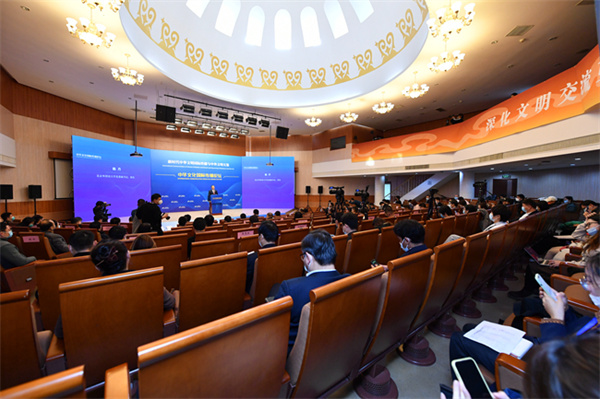
The 2022 International Communication Forum on Chinese Culture is held at BFSU on Nov 10. [Photo/bfsu.edu.cn]
Jointly hosted by the Center for International Cultural Communication under the China International Communications Group (CICG), the Academy of International Communication of Chinese Culture at BFSU, and the Research Center of Chinese Culture under the Academy of Chinese Culture, the event attracted nearly 100 domestic and foreign participants from governmental agencies and the academic circle, both in person and online.
Yang Dan, deputy Party secretary of the CPC BFSU committee and president of the university, addressed the forum. Wang Dinghua, Party secretary of the CPC BFSU committee, met with attending guests ahead of the forum.
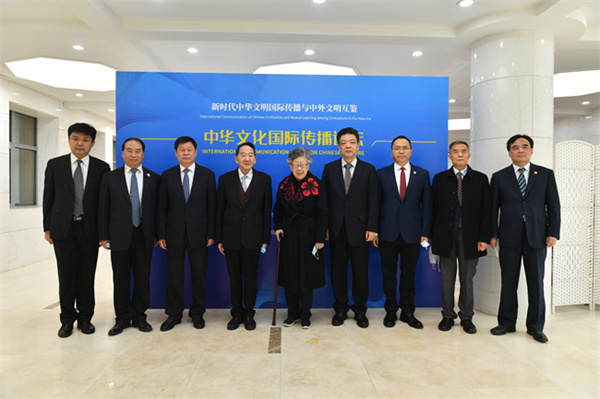
BFSU officials gather for a group photo with attendees of the International Communication Forum on Chinese Culture on Nov 10. [Photo/bfsu.edu.cn]
The opening ceremony was presided over by Lu Cairong, vice-president of the CICG; and the keynote speech session was chaired by Zhao Gang, member of the standing committee of the CPC BFSU committee and vice-president of the university.
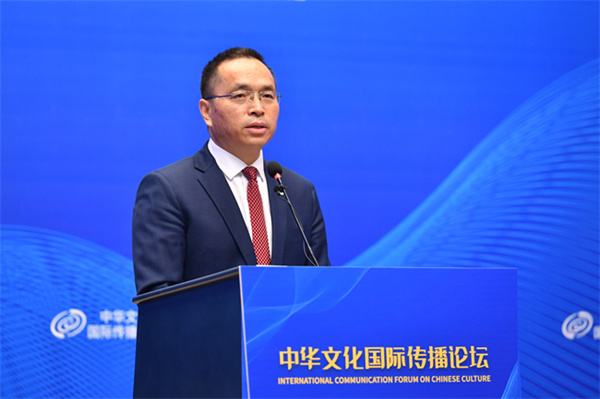
Yang Dan, deputy Party secretary of the CPC BFSU committee and president of the university, addresses the forum. [Photo/bfsu.edu.cn]
Yang said in his address that Chinese culture has not only become the source of cultural confidence cultivation, but also an important foundation for comprehensively advancing the great rejuvenation of the Chinese nation with the Chinese path to modernization.
In the new era, we should perform with the right conduct, integrate global culture, pool talents together and promote better exchanges and the dissemination of Chinese culture using a more open, diversified and interactive collaborative innovation mechanism, Yang suggested.
This forum has created a social network for the high-quality international communication of Chinese culture, urging the public to build an international communication alliance of Chinese culture, practice the common values of mankind, enhance global understanding, and create a better future for the world, he said.
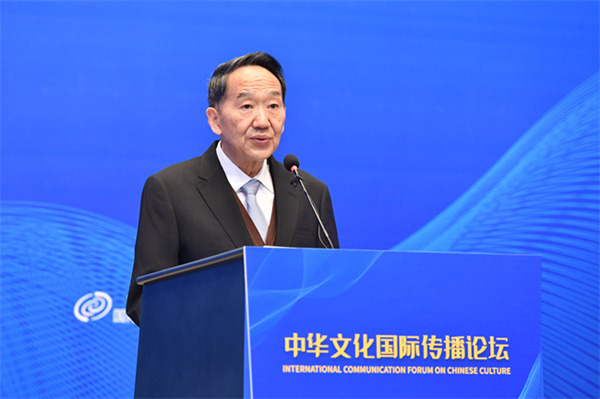
Jiang Jianguo, a member of the 13th CPPCC National Committee and deputy director of the National Ethnic and Religious Committee under the CPPCC National Committee, addresses the forum. [Photo/bfsu.edu.cn]
Jiang Jianguo, a member of the 13th Chinese People's Political Consultative Conference (CPPCC) National Committee and deputy director of the National Ethnic and Religious Committee under the CPPCC National Committee, suggested that the international dissemination of Chinese culture should be based on traditional culture, revolutionary culture, advanced socialist culture, contemporary culture, and the culture of Great Harmony to better share Chinese wisdom, spirit, values, dreams and solutions with the world.
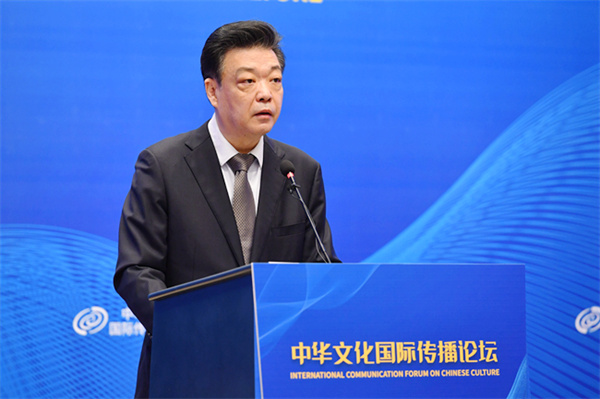
Ji Lin, first vice-president of the Academy of Chinese Culture, addresses the forum. [Photo/bfsu.edu.cn]
Ji Lin, first vice-president of the Academy of Chinese Culture, noted that under new historical conditions, telling the story of Chinese civilization well needs to be based on the great rejuvenation of the Chinese nation and the great changes that have not been seen in a century, highlight the new form of human civilization’s ideological values in the new era, and contribute to the common prosperity and development of countries across the world.
We should strengthen the main body, optimize the content, innovate the platform and expand channels for the international communication of Chinese culture, and tell stories of Chinese civilization in a multi-level and three-dimensional manner, Ji suggested.
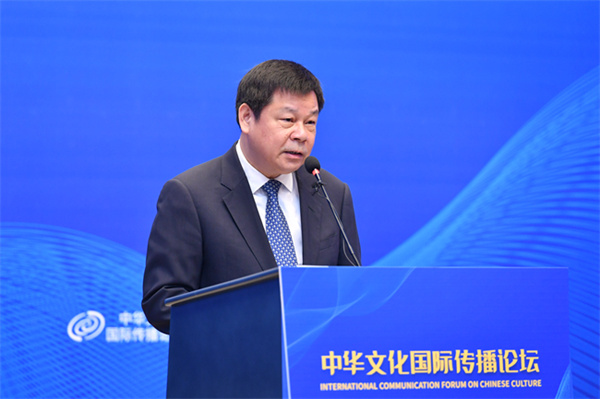
Du Zhanyuan, president of CICG, addresses the forum. [Photo/bfsu.edu.cn]
Du Zhanyuan, president of CICG, said that the forum aims to seek solutions to the complex problems faced by the world today through the utilization of Chinese wisdom and through the exchange and mutual learning of other civilizations. The Chinese civilization is sure to provide cultural support for building a community with a shared future for mankind, and inject strength into the progress of human civilization and the peaceful development of the world, Du said.
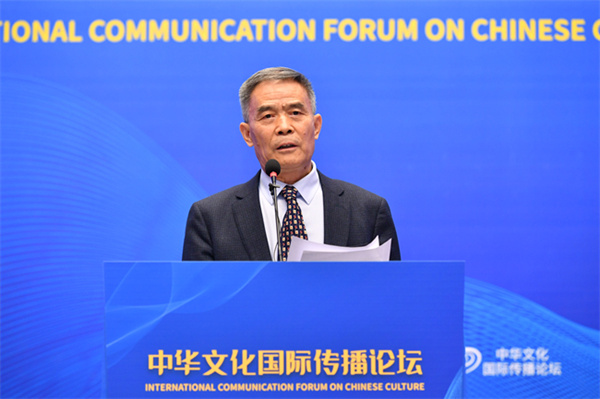
Jia Deyong, secretary-general of the ICA, addresses the forum. [Photo/bfsu.edu.cn]
Jia Deyong, secretary-general of the International Confucian Association (ICA), said that the ICA has been committed to inheriting Confucianism and traditional Chinese culture, protecting the diversity of world civilizations, and conducting dialogues among different civilizations for years. It has contributed to building a community with a shared future for mankind and promoting world peace and prosperity.
The association will continue to boost the inheritance, popularization and promotion of traditional Chinese culture, fuel exchanges and mutual learning among various civilizations, deepen international people-to-people exchanges and friendly communications, and vigorously promote sinologists' dialogues and Chinese studies, he said.
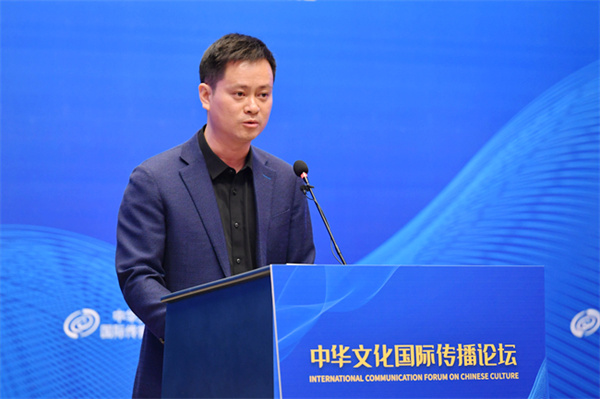
Luo Xianliang, deputy Party secretary of the CPC Palace Museum committee and vice-president of the museum, addresses the forum. [Photo/bfsu.edu.cn]
Luo Xianliang, deputy Party secretary of the CPC Palace Museum committee and vice-president of the museum, said that safeguarding, inheriting and carrying forward traditional Chinese culture, realizing its creative transformation and innovative development, constantly stimulating the vitality of traditional culture, and promoting Chinese culture to go global are not only the requirements of enhancing cultural confidence and improvements, but also the only way to strengthen international discourse in the new era.
This forum will break down cultural barriers, promote exchanges and mutual learning among civilizations, further enhance the international influence of Chinese culture and practice the concept of a community with a shared future for mankind, Luo noted.
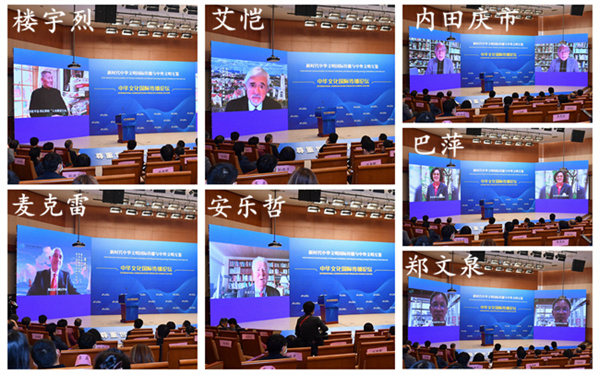
Experts from renowned domestic and foreign universities and research institutions deliver speeches at the forum via video link. [Photo/bfsu.edu.cn]
Lou Yulie, director of the Oriental Philosophy Teaching and Research Office at the Department of Philosophy and Religious Studies at Peking University, and honorary head of the Institution for Religion Studies at the university; Guy S.Alitto, an American sinologist and professor at the Department of History at the University of Chicago; Ferrero Michele, an Italian sinologist and director of the Latinitas Sinica at BFSU; Roger T. Ames, vice-president of the ICA; Keiichi Uchida, honorary professor of Kansai University, a PhD in literature and chairman of the Chinese Modern Language Society; Prapin Manomaivibool, a Thai sinologist and a professor at Chulalongkorn University; and Tee Boon Chuan, a sinologist from Malaysia, delivered speeches at the forum via video link.
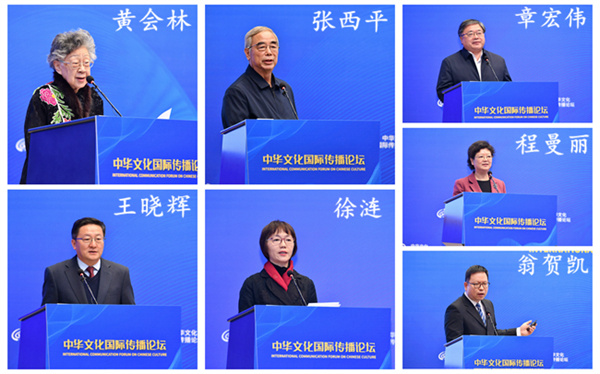
Seven scholars give keynote speeches at the International Communication Forum on Chinese Culture on Nov 10. [Photo/bfsu.edu.cn]
Huang Huilin, a senior professor from Beijing Normal University; Zhang Xiping, a senior professor from BFSU; Wang Xiaohui, editor-in-chief of China.org.cn; Xu Lian, deputy director of the China National Academy of Painting; Zhang Hongwei, chairman of the Forbidden City Publishing House; Cheng Manli, a professor from Peking University; and Weng Hekai, a professor from the Academy of Chinese Culture, delivered keynote speeches at the forum.
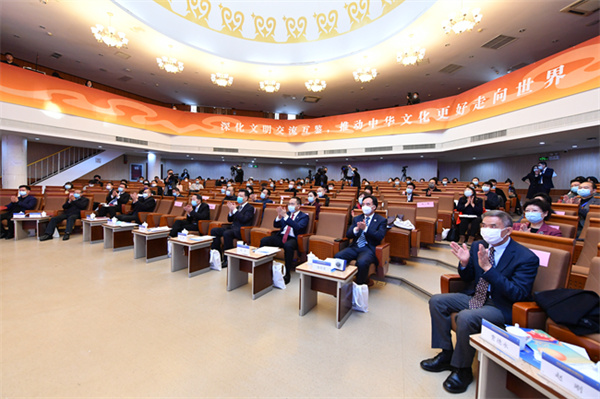
The International Communication Forum on Chinese Culture is attended by experts and scholars, governmental, academic and industrial elites, and young sinologists from multiple countries. [Photo/bfsu.edu.cn]
Themed on "international communication of Chinese civilization and mutual learning between Chinese and foreign civilizations in the new era", the forum included four parallel sessions on the mutual learning of Chinese and foreign civilizations, cultural digitalization and international communication, multinational enterprises and the communication of Chinese culture, as well as young sinologists and Chinese culture dissemination.
Sub-forum discussions were attended by experts and scholars from Tsinghua University, Renmin University of China, Beijing Normal University, the Communication University of China and BFSU, governmental, academic and industrial elites, and young sinologists from multiple countries.